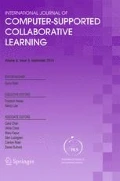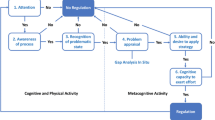Abstract
Collaborative learners are often meant to be guided by collaboration scripts to identify, discuss, and resolve differences of opinion and knowledge. How learners engage in and resolve conflict, however, may be highly dependent on learners’ cultural background. In this article, we examine the extent to which a peer-critique collaboration script induces socio-cognitive conflicts within Finnish and German groups of online learners. In a 2 × 2-design (Finnish/German × without script/with script), we analyzed online discussions in a problem-based learning environment of 16 German and 28 Finnish groups of three (132 participants in total) with or without script support. Trained coders rated the extent to which learners engaged in socio-cognitive conflicts, by indicating either agreement or disagreement. The results show that the peer-critique script could develop socio-cognitive conflicts. The German groups were affected more strongly by the script, even though the interaction patterns of unscripted German groups were already more conflict-oriented than those of unscripted Finnish groups. Agreement in Finnish groups mostly indicated that learners integrate arguments of learning partners into their own line of reasoning. Agreement in German groups, however, served coordination and continuation of discourse, e.g., by indicating comprehension of others’ ideas. The results showed that learning environments and collaboration scripts need to be designed with respect to culture. Furthermore, the findings emphasized that findings on computer-supported collaboration scripts cannot simply be generalized across different cultures.


Similar content being viewed by others
References
Berkowitz, M. W., & Gibbs, J. C. (1983). Measuring the developmental features of moral discussion. Merrill-Palmer Quarterly, 29(4), 399–410.
Clark, D. B., Stegmann, K., Weinberger, A., Menekse, M., & Erkens, G. (2008). Technology-enhanced learning environments to support students’ argumentation. In S. Erduran & M. P. Jiménez-Aleixandre (Eds.), Argumentation in science education (pp. 217–243). Dordrecht: Springer.
Cohen, J. (1988). Statistical power analysis for the behavioral sciences (2nd ed.). Hillsdale: Lawrence Erlbaum Associates.
De Lisi, R., & Goldbeck, S. L. (1999). Implication of Piagetian theory for peer learning. In A. M. O’Donnell & A. King (Eds.), Cognitive perspectives on peer learning (pp. 3–37). Mahwah: Erlbaum.
Fischer, F., Kollar, I., Mandl, H., & Haake, J. (Eds.). (2007). Scripting computer-supported communication of knowledge. Cognitive, computational and educational perspectives. New York: Springer.
Fischer, F., Kollar, I., Stegmann, K., & Wecker, C. (2013). Towards a script theory of guidance in computer-supported collaborative learning. Educational Psychologist, 48(1), 56–66.
Furberg, A. (2009). Socio-cultural aspects of prompting student reflection in Web-based inquiry learning environments. Journal of Computer Assisted Learning, 25(4), 397–409.
Hofstede, G. (1980). Culture’s consequences: International differences in work-related values. Beverly Hills: Sage.
Hofstede, G. (1997). Cultures and organisations: Software of the mind. New York: McGraw-Hill.
Hofstede, G., & McCrae, R. R. (2004). Personality and culture revisited: Linking traits and dimensions of culture. Cross-Cultural Research, 38(1), 52–88.
Johnson, D. W., & Johnson, R. T. (2009). An educational psychology success story: Social interdependence theory and cooperative learning. Educational Researcher, 38(5), 365–379. doi:10.3102/0013189X09339057.
Kim, K.-J., & Bonk, C. J. (2002). Cross-cultural comparisons of online collaboration. Journal of Computer-Mediated Communication, 8(1), 0–0. doi:10.1111/j.1083-6101.2002.tb00163.x.
Limón, M. (2001). On the cognitive conflict as an instructional strategy for conceptual change: A critical appraisal. Learning and Instruction, 11(4–5), 357–380.
Marttunen, M. J., & Laurinen, L. (2002). Quality of students’ argumentation by e-mail. Learning Environments Research, 5(1), 99–123.
Marttunen, M. J., Laurinen, L., Litosseliti, L., & Lund, K. (2005). Argumentation skills as prerequisites for collaborative learning among Finnish, French, and English secondary school students. Educational Research and Evaluation, 11(4), 365–384.
McCrae, R. R., & Terracciano, A. (2005). Universal features of personality traits from the observer’s perspective: Data from 50 cultures. Journal of Personality and Social Psychology, 88(3), 547–561. doi:10.1037/0022-3514.88.3.547.
Metcalf, L., & Bird, A. (2004). Integrating the Hofstede dimensions and twelve aspects of negotiating behavior: A six country comparison. In H. Vinken, J. Soeters, & P. Ester (Eds.), Comparing cultures: Dimensions of culture in a comparative perspective (pp. 251–269). Amsterdam: Brill.
Metcalf, L., Bird, A., Shankarmahesh, M., Aycan, Z., Larimo, J., & Valdelamar, D. D. (2006). Cultural tendencies in negotiation: A comparison of Finland, India, Mexico, Turkey, and the United States. Journal of World Business, 41, 382–394.
Noroozi, O., Weinberger, A., Biemans, H. J. A., Mulder, M., & Chizari, M. (2012). Argumentation-based computer supported collaborative learning (ABCSCL): A synthesis of 15 years of research. Educational Research Review, 7(2), 79–106.
Oetzel, J. G., & Ting-Toomey, S. (2003). Face concerns in interpersonal conflict - A cross-cultural empirical test of the face negotiation theory. Communication Research, 30(6), 599–624.
Pfister, H. R., & Oehl, M. (2009). The impact of goal focus, task type and group size on synchronous net-based collaborative learning discourses. Journal of Computer Assisted Learning, 25(2), 161–176.
Putnam, L. L., & Wilson, C. (1982). Communication strategies in organizational conflicts: Reliability and validity of a measurement. In M. Burgoon (Ed.), Communication yearbook 6 (pp. 629–652). Beverly Hills: Sage.
Salminen, T., Marttunen, M., & Laurinen, L. (2010). Visualising knowledge from chat debates in argument diagrams. Journal of Computer Assisted Learning, 26(5), 379–391.
Salminen, T., Marttunen, M., & Laurinen, L. (2012). Argumentation in secondary school students’ structured and unstructured chat discussions. Journal of Educational Computing Research, 47(2), 175–208.
Schellens, T., Van Keer, H., De Wever, B., & Valcke, M. (2009). Tagging thinking types in asynchronous discussion groups: Effects on critical thinking. Interactive Learning Environments, 17(1), 77–94.
Steffensen, M. S. (1996, August). How Finns and Americans persuade? Paper presented at the 11th World Congress of Applied Linguistics (AILA 96).
Stegmann, K., Weinberger, A., & Fischer, F. (2007). Facilitating argumentative knowledge construction with computer-supported collaboration scripts. International Journal of Computer-Supported Collaborative Learning, 2(4), 421–447.
Stegmann, K., Wecker, C., Weinberger, A., & Fischer, F. (2012). Collaborative argumentation and cognitive elaboration in a computer-supported collaborative learning environment. Instructional Science, 40(2), 297–323.
Tapanes, M. A., Smith, G. G., & White, J. A. (2009). Cultural diversity in online learning: A study of the perceived effects of dissonance in levels of individualism/collectivism and tolerance of ambiguity. Internet and Higher Education, 12(1), 26–34.
Taras, V., & Steel, P. (2009). Beyond Hofstede: Challenging the ten commandments of cross-cultural research. In C. Nakata (Ed.), Beyond Hofstede: Culture frameworks for global marketing and management (pp. 40–60). New York: Macmillan.
Teasley, S. (1997). Talking about reasoning: How important is the peer in peer collaboration? In L. B. Resnick, R. Säljö, C. Pontecorvo, & B. Burge (Eds.), Discourse, tools and reasoning: Essays on situated cognition (pp. 361–384). Berlin: Springer.
van de Vijver, F. J. R., & Leung, K. (1997). Methods and data analysis for cross-cultural research. Thousand Oaks: Sage.
Walsh, S. L., Gregory, E., Lake, Y., & Gunawardena, C. N. (2003). Self-construal, facework, and conflict styles among cultures in online learning environments. Educational Technology Research and Development, 51(4), 113–122.
Weinberger, A., & Fischer, F. (2006). A framework to analyze argumentative knowledge construction in computer-supported collaborative learning. Computers & Education, 46, 71–95.
Weinberger, A., Ertl, B., Fischer, F., & Mandl, H. (2005). Epistemic and social scripts in computer-supported collaborative learning. Instructional Science, 33(1), 1–30.
Weinberger, A., Clark, D. B., Häkkinen, P., Tamura, Y., & Fischer, F. (2007a). Argumentative knowledge construction in online learning environments in and across different cultures: A collaboration script perspective. Research in Comparative and International Education, 2(1), 68–79.
Weinberger, A., Stegmann, K., & Fischer, F. (2007b). Knowledge convergence in collaborative learning: Concepts and assessment. Learning and Instruction, 17(4), 416–426.
Weiner, B. (1985). An attributional theory of achievement motivation and emotion. Psychological Review, 92, 548–573.
Zhu, C., Valcke, M., & Schellens, T. (2009). Cultural differences in the perception of a social-constructivist e-learning environment. British Journal of Educational Technology, 40(1), 164–168.
Acknowledgments
This research was funded by the Deutsche Forschungsgemeinschaft (DFG) and the EU Network of Excellence ‘Kaleidoscope’, European Research Team CoSSICLE (Computer-Supported Scripting of Interaction in Collaborative Learning Environments). We would like to thank Päivi Häkkinen, Frank Fischer, Maarit Arvaja, Raija Hämäläinen, and Carita Kiili for making this research possible within the CoSSICLE context.
Author information
Authors and Affiliations
Corresponding author
Rights and permissions
About this article
Cite this article
Weinberger, A., Marttunen, M., Laurinen, L. et al. Inducing socio-cognitive conflict in Finnish and German groups of online learners by CSCL script. Computer Supported Learning 8, 333–349 (2013). https://doi.org/10.1007/s11412-013-9173-4
Received:
Accepted:
Published:
Issue Date:
DOI: https://doi.org/10.1007/s11412-013-9173-4




